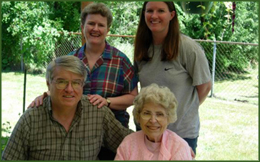
Dear Friends

What Anointing of the Sick Is . . .
and Isn't
Week of August 3, 2015
Prayer Requests
Dear Friends,
When I think back a few years when both my wife, Monica, and my mom, Margaret, were nearing death, among the truly bright spots of that time were their receiving the anointing of the sick.
It's a wonderful sacrament!
And, often it seems, a misunderstood and underused one, too.
Here's how one of our fliers/topics talks about the anointing of the sick:
In years gone by, one of the final things a family would do for a dying loved one was notify the local priest. He would hurry to the house or hospital and administer the "last rites."
In general, the sacrament,
then known as extreme unction (final anointing), was reserved for
someone on his or her death bed. Since the Second Vatican Council
(1962-1965), that’s no longer the case.
Now known
as the Anointing of the Sick or Sacrament of the Sick, it’s commonly
administered to anyone who has reached "the age of reason" (around
seven years old) who's seriously ill. And it's also available for
anyone who's elderly. In either case,
the recipient does not have to
be near death.
It's
important to explain this to your care-receiver. "Calling the
priest" does not mean he
or she is dying. It does not
mean your dad is in worse shape than he realizes or that you're
keeping some information about your mom’s medical condition from
her.
It's also important to know
the Anointing of the Sick isn't a "magical" sacrament designed to
cure illness. Yes, sometimes a person does get well. But the purpose
of the sacrament is to give the person grace and to forgive his or
her sins.
In administering the sacrament, the priest
will anoint your loved one’s forehead and hands with blessed oil and
say some prayers. You, and others, are welcome to be present.
It could be that sometime during the year
your care-receiver’s parish has a communal celebration at the
church, perhaps at a Sunday Mass.
A person can receive this sacrament more than
once. If you aren’t sure if it would be appropriate for your loved
one to be anointed, ask your local priest.
For more information see the Catechism of the Catholic Church, 1499-1532.
You can find the topic here and the printable flier here.
And in the photo are (clockwise from upper left): Monica, (our daughter) Carrie, (my mom) Margaret, and me. God has been, and continues to be, so very good to me!
- - -
I encourage you to take a moment and look through our order form. We're here to help family caregivers, care-receivers, and those who help both! You can find our order form here. All items are free. Always free! You can mail it in, send us an e-mail, or give us a call.
- - -
This week we're so pleased to welcome Art F. of Michigan as the newest member of the Friends of St. John the Caregiver. Please keep him and his intentions in your prayers. He has promised to pray for you and yours.
And again this week we cordially invite you to join the Friends of St. John the Caregiver! (FSJC's programs include YourAgingParent.com and CatholicCaregivers.com.) You can find out more about becoming a member here.
No meetings, no dues. All we ask is that you pray for caregivers and those receiving care. Our members include caregivers, care-receivers, and those who support both (including quite a few former caregivers).
You can:
sign up on-line here
or call us toll-free at 1-800-392-JOHN (5646)
or
print and mail an application form.
God bless you!
Bill